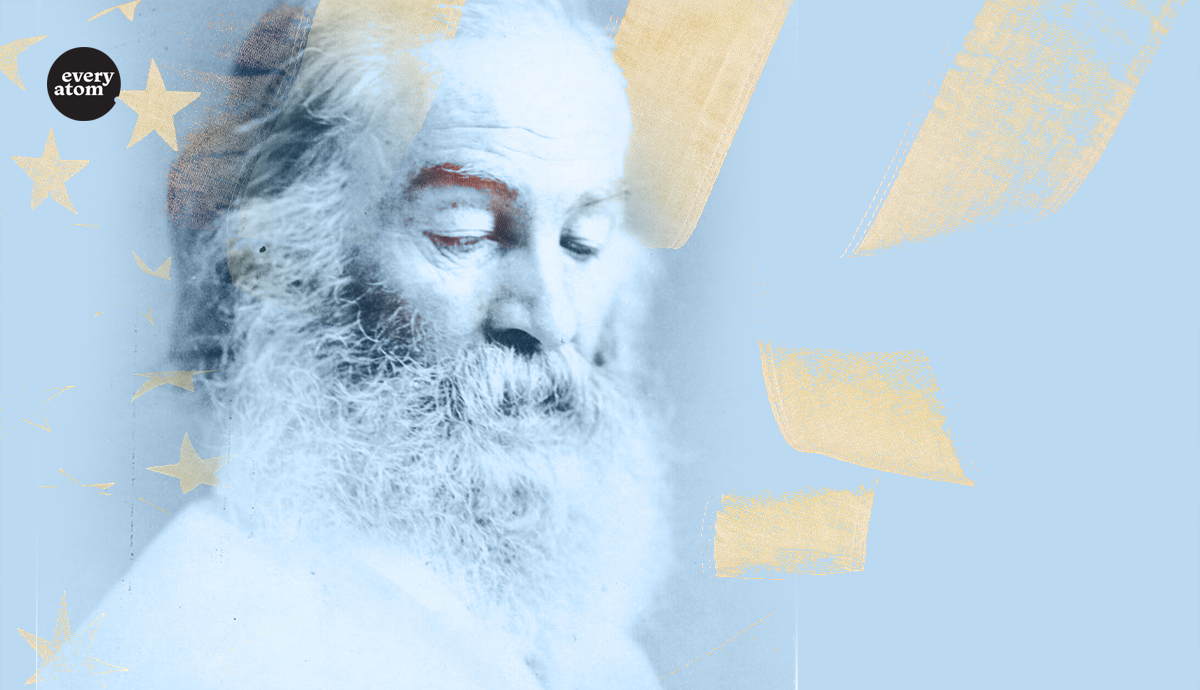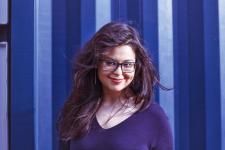Every Atom | No. 45
Introduction to Every Atom by project curator Brian Clements
In recent years I have not felt drawn to “Song of Myself.” What once felt thrillingly and galvanizingly “omnivorous,” to use Whitman’s own word from the part of the poem about which I am writing today, has come to me to feel more emptily braggadocious than bold or audacious. Perhaps the best way to explain this is with a different poem of Whitman’s, a very short lyric called “A Noiseless Patient Spider.”
Like the speaker of “Song of Myself,” the spider in “A Noiseless Patient Spider” is relentless, curious, expansive, hungry. “It launch’d forth filament, filament, filament, out of itself, / Ever unreeling them, ever tirelessly speeding them;” it is “Ceaselessly musing, venturing, throwing, seeking the spheres to connect them.” But “A Noiseless Patient Spider” is haunted by the fragility of its gestures and its connections. The spider, also like the speaker of “Song of Myself,” has an explorer’s imagination—“on a little promontory it stood isolated, / Mark’d how to explore the vacant vast surrounding”—which is an impulse that both attracts and troubles me. But it has only “gossamer thread” with which to play out its imagination, and as a result its grandest desires boil down to hoping that this gossamer might “catch somewhere,” which is an ambiguous and modest dream.
By contrast, “Song of Myself” doesn’t seem to have quite enough anxiety, quite enough uncertainty, or quite enough self-questioning for the larger gestures with which it throbs to fully resonate with me. I should be clear: it’s not that these qualities don’t exist in the poem, but rather that they never seem to speak as forcefully as the poem’s more dominant gestures. It’s with this concern in mind that one line from the 1855 version stood out to me for this occasion: “My words are words of a questioning, and to indicate reality.”
At this point in the poem, Whitman’s speaker has just admitted to his egotism, in one of those many moments that—like the oft-quoted bon mot regarding self-contradiction—seems to delight a bit much for my taste in its own sophistry: “I know perfectly well my own egotism, / And know my omnivorous words, and cannot say any less.” But here, the poem transitions toward a peculiar hope that shares some of the spider’s modesty: a desire to “fetch” a nameless “you, whoever you are” (emphasis mine), to his side, not to merge with him or be devoured by him, but merely to be “flush with” himself. And then: “My words are words of a questioning.” Not a proclamation. Not a yawp. Not even a particularly profound or significant question. Simply, a questioning. And then, “to indicate reality.” No massive claims to truth-telling or suggestion of mystical insight into the ways of persons and things, of lands and of creatures; not even—as he’ll say in the twenty-third section of the later version of the poem—the definitive, if somewhat fearful, bravura of a line like “I accept Reality and dare not question it.” Only this: a hint that this speaker may, simply put, be capable of gesturing at some of the world’s shapes and shadows—to outline for us what he feels to be real.
In later versions of “Song of Myself,” Whitman revises this line into two that mute the above effects: “Not words of routine this song of mine, / But abruptly to question, to leap beyond yet nearer bring.” He also revises away the ellipses that proliferate in the 1855 version, which make the poem seem stranger, abyssal, more hesitant even in its assertions. (Not unrelatedly, the later version’s “I accept Reality” line is, in the earlier version, the much more tremulous and haunting phrase “A word of reality . . . .”) As I turn to “Song of Myself” now, the moments that help make the poem significant for me are of a more querulous and hesitant nature, particularly the ones palimpsestically revised out of the version of the poem we most readily recognize—those that confess to the possibility that the poem’s heady, breathless, giant dreams might simply be “words of a questioning.”
Recommended
Nor’easter
Post-Op Appointment With My Father
Cedar Valley Youth Poet Laureate | Fall 2024 Workshop







